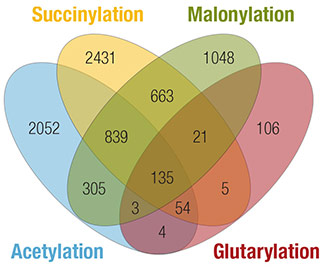AcylScan™ - Acylation Proteomics

Profiling lysine acylation in liver peptides from wild type and Sirt5 knockout mice: Venn diagram showing the degree of overlap of sites identified using the four indicated acylation-specific antibodies. See full dataset here.
Lysine residues are subject to a wide range of post-translational modifications due to the positively charged ε-amino group side chain. Acyl group transfer from the metabolic intermediates acetyl-, succinyl-, malonyl-, glutaryl-, butyryl-, propionyl-, and crotonyl-CoA all neutralize the positive charge of lysine and confer structural alterations affecting substrate protein function. Cellular functions regulated by acylation include cell cycle regulation, mitochondrial metabolism, cytoskeletal regulation, protein-protein interactions and others.
AcylScan™ technology for acylation proteomics uses proprietary acetyl- (Ac-K), glutaryl- (Glut-K), malonyl- (Mal-K), propionyl- (Prop-K), and succinyl-lysine (Succ-K) antibodies to enrich their respective acyl-containing peptides from trypsin digested samples prior to LC-MS/MS analysis.

